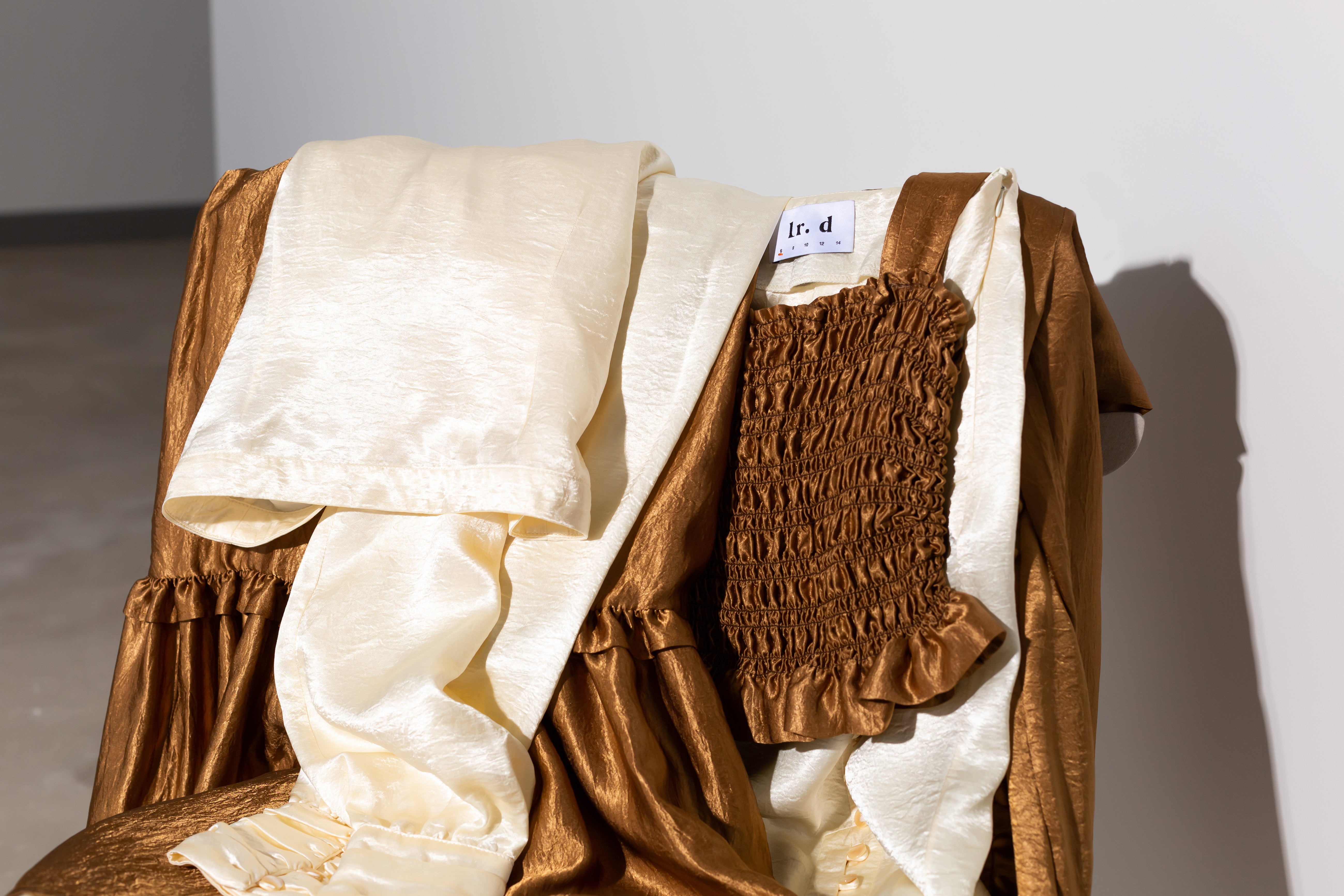
Our collections are a continuing study in responsible practices. We maintain close relationships with our makers to ensure ethical supply chains and fair, living wages.
Circular design principles influence our choice of materials, and in turn the designs themselves, serving to reduce waste in the short and long term.
Small-batch production allows us to keep a minimal carbon footprint while at the same time maintaining our emphasis on impeccable craftsmanship. We source only premium, low-impact materials, primarily organic, biodegradable and surplus with a goal to move towards more recycled fabrics as we grow.
Linen | Flax is one of the most sustainable raw materials in the world. The plant needs no additional irrigation while it grows; rainwater is the only water it requires! After it's harvested, the entire plant is used - for food, animal bedding, textiles, insulation and more. It is biodegradable and compostable. One study suggests that linen will biodegrade after 6 and a half months of composting.
Our beautiful organic linen is GOTS (Global organic textiles standard) and OEKO-TEX certified. It is farmed and spun in Europe and woven by Libeco, a Belgian mill with a fully carbon neutral footprint and using zero-waste production methods. They use 80% renewable wind energy and 20% of their own energy from solar panels. Any waste selvedge and shearing dust is recycled into insulation materials or paper.
According to the European Confederation of Linen and Hemp (CELC), each year European grown flax captures 250,000 tonnes of CO2 from the atmosphere, which is the equivalent of what's emitted by driving a car around the world.
On top of that, our linen mill is one of only six in the world that carries that Belgian Linen™ quality label. It guarantees quality, traceability and authenticity. It also carries the Masters of Linen® quality label that guarantees that the linen was made entirely in Europe through transparent and traceable production processes.
Naia triacetate | Eastman Naia™ is an OEKO-TEX certified, regenerated cellulose fabric, which means it is made from sustainably sourced pine and eucalyptus wood pulp. It is grown and spun in the USA, and then woven by a Japanese fabric mill.
The forests and plantations are FSC certified and strictly managed to ensure no deforestation of protected forests. Eastman Naia™ ensures full transparency from tree to fibre and has the highest safety, social, and environmental standards.
It has a low environmental impact/carbon footprint as it is made through closed-loop production processes that recycle up to 99% of water and safe solvents used. Naia™ is biodegradable and compostable.
It's also hypoallergenic, quick drying and easy to care for.
Corozo buttons | Our buttons are made from the Corozo nut which comes from the tagua palm tree, native to Central America. Once it’s ripe, it naturally drops off the tree. The locals collect and sell the seeds to obtain an income, which allows them to live off what the forest produces. This also means that the rainforests in which they grow are maintained and protected from deforestation due to their economic worth. So by using corozo buttons, we are indirectly helping to keep these ancient rainforests safe and protected.
The buttons themselves are made here in England by British heritage button makers, Courtney & Co who, like LR.D, put sustainability and ethical supply chains at the forefront of their business. They use OEKO-TEX certified dyes, responsibly-sourced natural raw materials and sustainable packaging.
What’s more, Courtney & Co are reviving a centuries-old British craft, using traditional techniques, and aiming to train the next generation of skilled button makers to keep the trade alive in England.
Mother of pearl buttons | Mother of pearl is a natural material that is derived from the shells of molluscs, such as oysters and mussels. These lovely buttons are a bi-product of the Japanese food industry and ama divers who collect pearls. Normally the shells are discarded but, following a zero-waste ethos, the shell has been repurposed to make natural and beautiful buttons and other accessories.
Recycled poly zips | We have tried to minimise the use of zippers in the collection as the perfectly sustainable or biodegradable option doesn’t yet exist.The zippers we use are mainly YKK’s Natulon range, which are bluesign approved, and made of recycled PET bottles and other post consumer materials. This means they are not biodegradable.
Our light invisible zips that are paired with the Satin Naia™ are unfortunately not made of recycled materials but performed much better with the fabric.
We will keep researching better options as they become available.
Eco fusing | Our interlinings are made in Germany, of OEKO-TEX certified viscose.
Interlining is a hidden component often used in collars, cuffs and waistbands to create extra stability. It is needed in order to produce a good quality garment that will keep its shape over time.
Hours upon hours of time and research have gone into finding the most sustainable option. The goal was to find a biodegradable option as most interlining is synthetic. The interlining we chose is biodegradable, apart from a fine layer of adhesive that allows it to fuse to the fabric, which is not yet biodegradable.
We did also look at a non-fusible option, but it didn’t provide the same stability, which in turn would mean the garment wouldn’t hold it’s shape as well. Therefore in this instance, we chose garment quality over biodegradability.
Recycled polyester thread | Thread is another sneaky component that is often made of synthetic materials. Good-quality thread is really important in helping garments last. Cotton thread can snap quite easily, so although it is biodegradable, a garment will need constant repair.
We have found that polyester thread is the most durable. So we have opted for a recycled polyester thread that is made in Germany. No new raw materials have been used to produce it, in fact it takes just one plastic drinking bottle to produce 1000m (approx) of thread.
Shirring elastic | This elastic is made of 53% Polyamide 47% natural latex, and is crafted in Spain.
The OEKO-TEX, MADE IN GREEN label verifies that the elastic has been tested for harmful chemicals as well as guaranteeing that it has been manufactured using sustainable processes and under socially responsible working conditions.
Organic cotton + 100% natural rubber elastic | Made in Austria by a family run business, this elastic is the world’s first natural and plastic free elastic. It is made of organic cotton that comes from Turkey and rubber from child labour-free plantations in Malaysia. What’s more is that it also has a longer lifespan than other elastics!
Recycled poly labels | Our garment labels are made in Europe from recycled polyester.
Recycled paper swing tags | Our swing tags are made in Europe of recycled paper.

